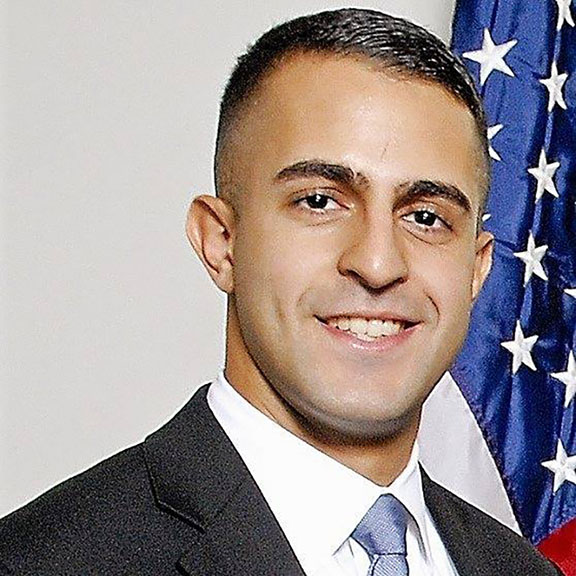By Allison Perrine
RED BANK – Political meddling and outdated practices have led current and former borough officials to advocate for nonpartisan government in Red Bank, charter study commission members learned this week.
During a virtual commission meeting Tuesday, three individuals – one current and two former local leaders – testified to the ineffectiveness of the borough under its long-standing partisan government operations.
Former borough administrator Ziad Shehady said partisan politics “absolutely” got in the way during his time as a borough employee and current councilwoman Kathy Horgan suggested a nonpartisan government could “take power out of the hands of certain people who are holding the reigns on who can run” for office.
“I think if we had less meddling by certain council people, we’d be able to reach that goal,” she shared Tuesday.
Shehady was the first to present that night, followed by Horgan and then former councilwoman Linda Schwabenbaeur. Commissioners on the five-member board had a chance to ask each interviewee questions and gain insight on their experiences working with others in Red Bank government.
Shehady served as the borough’s business administrator from 2018 through 2021. When he arrived, the town was operating under what he described as an “analog” government which “worked for a long time” but no longer best served the community in a growing digital age.
“When you don’t have fresh ideas, new people coming in from the outside, you tend to do things the way they’ve always been done and that can be a pitfall,” he said. “Some employees hated when I would say ‘Listen, I don’t care about that, we’ve got to move on,’ because for some employees they just wanted to keep living in the past.”
Shehady arrived in Red Bank with personal experience in local government after serving as a former mayor and township committee member in Springfield. The township had been through a charter study as well but ultimately decided that a change in government style was not necessary. This week, Shehady reflected on the outcome and felt it resulted from a game of politics.
“Most of the time when a recommendation is made to remain and not change the form of government, it’s because of politics: incumbent political majorities or key power players who want to maintain the status quo,” said Shehady.
However, he noted that a form of government doesn’t necessarily cause the misfunction in a town – it’s the application of that governement.
“It’s how it’s carried out,” Shehady said. “It’s when you have partisan political affiliations in local government that lead to mismanagement and not having a local government run the best way it possibly can.”
During his time in town, Shehady was unpopular with some critical residents. He said he resigned from his position last year “not because of any pressure, influence or hardship” but because an appealing opportunity had been presented to him.
“That outweighed my interest to work in a town I felt that the trajectory of governance was reverting to some of the old ways, to the habits and behaviors that I think led to a tipping point in 2017 that necessitated a management enhancement review,” he said.
When asked by commissioner Ben Forest if the partisan system of politics in Red Bank impacted his day-to-day work as the business administrator in town, Shehady said it “100 percent” did.
“I think a large part of it had to do with people who did not respect the majority of the council,” he said. “We don’t always have to agree with each other… but we can respect each other.”
For some time, on the all-Democratic dais, current council members Michael Ballard and Ed Zipprich have clashed with Horgan, councilwoman Kate Triggiano and former members Erik Yngstrom and Hazim Yassin – and on a multitude of issues, such as the handling of the senior center, business administrator search and more.
“There were a lot of times where the council – whether it was in executive session or at a workshop or in public – the majority would agree on something or give me direction to do something, and then one or two elected officials who for whatever reason were not happy with that decision would go outside of that system and undermine the majority,” Shehady said.
“What I was finding, for political reasons, people would use their political influence, their titles in the political organizations or whatever, to try and spread misinformation or spread information that was not yet ready for public consumption or incomplete information with their agenda in mind. And so that ended up being more frustrating that anything.”
Next to speak was councilwoman Horgan who has been an elected official in Red Bank for about 15 years. During her time on the dais, she has seen several interested residents wish to participate in local politics but “because the power is held in just very few hands, people don’t feel welcomed,” she said.
“The demographics are changing here in town. The world is changing, but Red Bank has changed even over the 20 years I’ve lived here. There are young people, there are young families moving in,” she said, “and they’re interested in politics.”
Years ago, Horgan felt nonpartisan wasn’t the best option for Red Bank but she has since changed her mind because the political environment has become “very toxic” over the years. She is now advocating for nonpartisan politics in the borough and feels it will bring in a “more inclusive” atmosphere.
“I think we need change because it cannot go on the way it is,” she said.
Schwabenbaeur seemingly agreed with that sentiment.
During her interview, the former councilwoman said partisan elections “should go away” at the local level in Red Bank for several reasons – the first being that the pool of candidates is limited.
“You’ve got a lot of people whose companies will not let them run in a partisan election. We ran into that many times when we were trying to get people to run,” she said. “We’ve had some really strong independent candidates coming through who can’t get elected because they’re not with a party.”
Commissioner Michael DuPont, who once served on the borough council, asked Schwabenbaeur why she thinks elected officials in Red Bank can’t get along. She said it’s because the Red Bank Democrats party chair (councilman Ed Zipprich) is “picking who he wants to have on the council and if there are people who disagree with him, he doesn’t really want those people on the council and that creates some friction,” she said. “It’s structural and there’s personalities involved and I don’t think you get out of that until you get out of just party politics.”
The article originally appeared in the February 17 – 23, 2022 print edition of The Two River Times.















